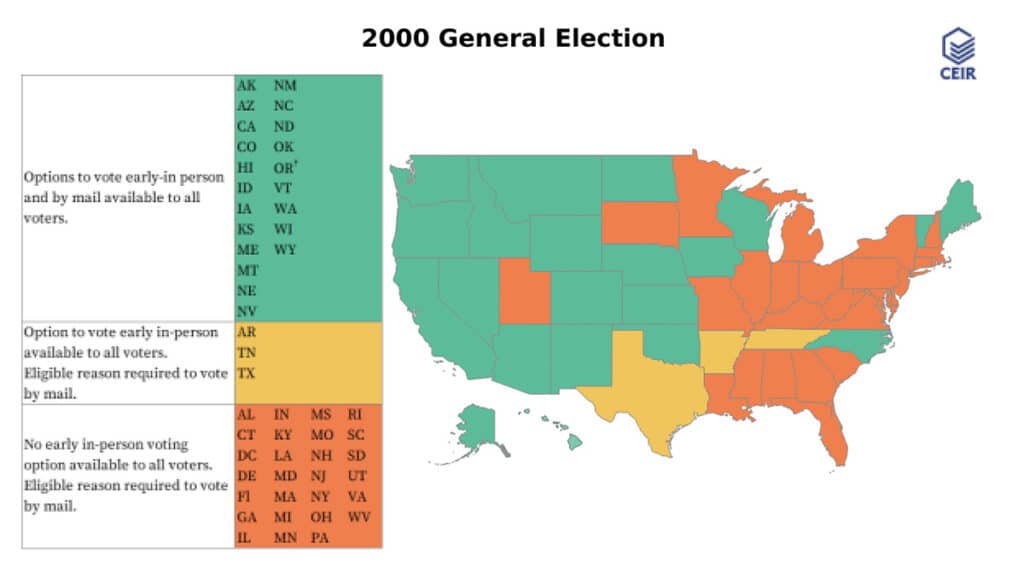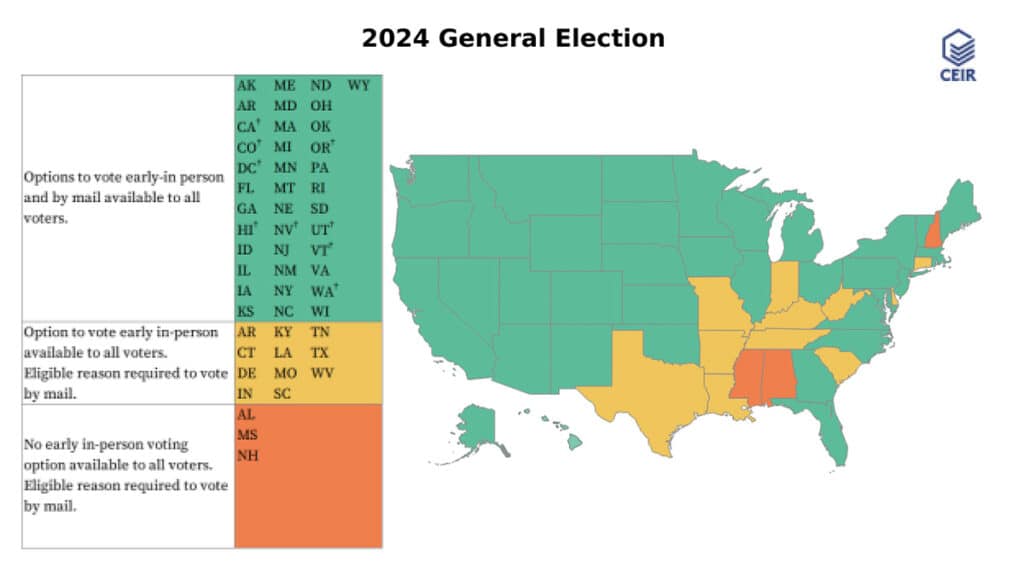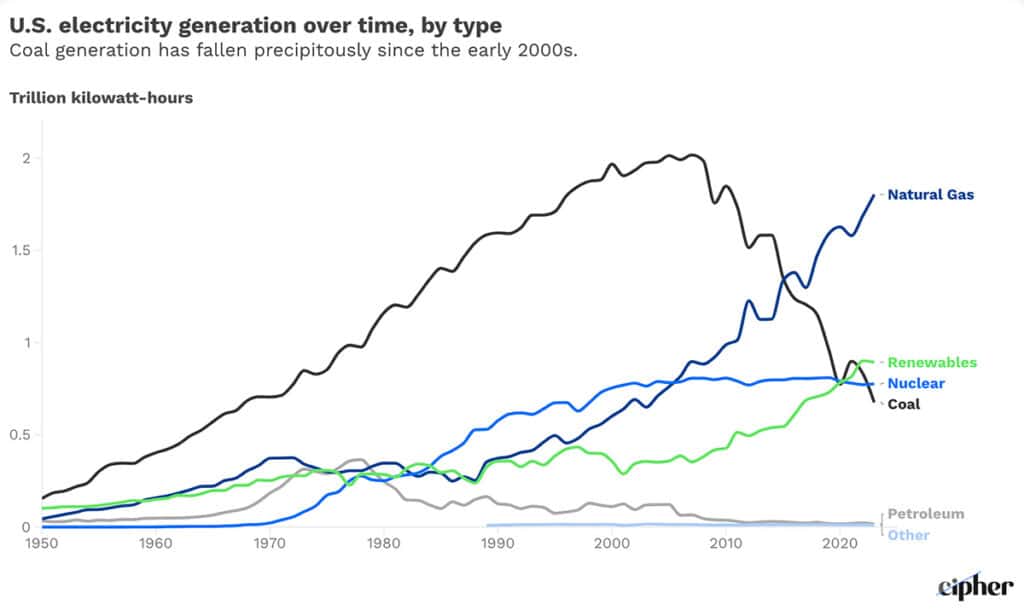Volcanoes are erupting in The Philippines, but on-fire Australia received some welcome rain. The Iran war cries have been called off and The Donald’s military powers are about to be hamstrung by the Senate. Meanwhile, his impeachment trial is starting, and we’re all on Twitter for a front-row seat.
What Could Go Right? Three Election Silver Linings
The multiracial coalition that will prevent civil war, the fate of the clean energy transition, and more
This is our weekly newsletter, What Could Go Right? Sign up here to receive it in your inbox every Thursday at 5am ET. You can read past issues here.
Three Election Silver Linings
With the news cycle still focused on all things the coming Trump administration, we’re doing a little more on the election this week. But, I promise that we will move beyond politics, and specifically President-elect Donald Trump, next week and into the holiday season. Below, you’ll find discussions of three under-discussed aspects of the election. If you’re not a Trump fan, consider them silver linings.
1. No ethnic divide
Much has been written about the rightward shift of nearly all voter demographics this presidential election, including Latino men, working-class voters, Asian Americans, women, voters of color more broadly, and so on and so on. “The only places Vice President Kamala Harris made real gains on Trump were with white, educated, and wealthy voters,” reports NBC News.
This great realignment reflects the more populist inclinations of the modern Republican Party, even if Trump ends up proposing cuts to many assistance programs. It’s the reason why Vice President-elect JD Vance supports increasing the child tax credit to $5,000 per child, a position hard to imagine traditional Republicans taking even a decade ago. That the Republican Party would be the political party to successfully amass a multiracial, working-class coalition would be hard to imagine a decade ago as well.
Aside from potential policy outcomes and perhaps the intrinsic virtue of such a broad-based coalition, there is another positive aspect that Progress Network Member Robert Wright pointed out during a podcast taping this week: it makes the descent into civil war even less likely. (The episode is not yet available, but watch for its drop on November 20.) Historically, societies that have fractured along ethnic lines are the ones that have hardened into violence. Imagine, in the multiracial nation that is the United States, what kind of landscape we could be in if most nonwhite voters, like the right once predicted, had ended up voting left, and most whites—and only whites—had shifted right. It doesn’t sound pretty.
2. Voting convenience has transformed
I’ve written before about how elections in the US have become more secure over time. Over the last 25 years or so, they have also become more convenient, by way of early voting. The option has greatly expanded, from 24 states in 2000 to 47 of them in 2024, according to The Center for Election Innovation & Research (CEIR).


Despite the massive difference between then and now, the 2024 map is actually less expansive than the one from 2020, during which the pandemic necessitated a mass switch to early voting that only Mississippi did not allow. Since then, Alabama and New Hampshire have also opted not to make it available to all voters. Still, this is a significant change since 2016, when 12 states did not offer early voting to all voters.
Early voting is a boon for anyone who faces difficulties voting in person on Election Day, whether that be due to childcare or other responsibilities, work commitments, long lines, or closed voting locations. More early voting mitigates situations like the one the nation saw this election, in which voting centers were evacuated due to bomb threats from Russia.
It’s also, CEIR says, a trend that defies partisan categorization—early voting doesn’t benefit any one particular party, and has been supported by both red and blue politicians.
3. The clean energy transition can be slowed, but not stopped
In late 2023, we invited Jigar Shah onto the What Could Go Right? podcast. Shah is a clean energy pioneer who directs the loans program office in the US Department of Energy under the Biden administration. The loans office is in charge of awarding government loans to companies developing emerging green technology.
At the time, I asked Shah what would happen to the clean energy transition in the US should we have an administration turnover in 2024. In response, he told us to pay less attention to the political headlines and take a look at the underlying investment instead: That some of the largest investors in carbon sequestration and storage technologies are the oil and gas industry. That some of the largest investors in battery technologies are large Republican donors. That most of the factories—to manufacture solar panels, for instance—funded by dollars from the Inflation Reduction Act (IRA) are in Republican-voting districts. And that some red states, like Texas and Oklahoma, are renewable energy leaders.
A new article in Grist, an online outlet focusing on climate solutions, makes much the same argument. It’s unclear how much states will allow a federal rollback of the IRA, since many of the states benefiting from IRA funds are red—something like 66 percent of them went to Republican-led states, Zeke Hausfather, a research scientist at Berkeley Earth, told the publication. “There is certainly a contingency in the Republican Party now that’s going to support keeping some of those subsidies around.”
We are also going through what Cipher News, another online climate solutions outlet, called a “paradoxical” transformation of our energy systems. The use of coal for electricity generation has fallen precipitously, and renewables have shot up. Meanwhile, natural gas has also soared, and nuclear energy has flatlined.

Market forces, not government intervention, are driving this transition. Coal generation is shrinking because people want to pay lower electricity prices, and renewables are the cheapest choice. “Despite the GOP’s call to ‘drill, baby, drill,’ the US has been the world’s top producer of oil since 2018 and natural gas since 2011,” Cipher reports. Crude oil production has also been rising since 2009.
That is not a picture of rosy climate news, but it does reveal a background context that is more independent of political turnover than many realize. It also highlights the headwinds Trump will face when it comes to fighting the clean energy transition. He will be able to slow it down, but not stop it entirely.
What Could Go Right? S6 E29

How can Americans interact with the opposing political party after such a divisive election? Can community building help Americans look past what is happening at the federal level? Are there groups of people that should now be looking to leave the United States? In their first conversation since the 2024 US presidential election, Zachary and Emma speak with Ana Marie Cox, political commentator and host of her podcast, 90 Days with Ana Marie Cox. They discuss what campaign promises Trump could deliver on, how to recover from an emotionally draining election, and the power of human connection in overcoming political divides. | Listen now
By the Numbers
8: The number of countries that pledged last week to ban corporal punishment, the most common form of violence against children.
1 in 4: The number of people living on less than $6.85 per day in Latin America, the lowest level of poverty seen there this century.
3,000: The number of genomes sequenced so far by the Earth BioGenome Project, which aims to sequence the 1.67 million genomes of all known eukaryotes, or species with complex cells—plants, animals, fungi, and microbes—on Earth by 2032.
Quick Hits
🗳️ The US election also brought us the Senate’s first Korean American and first female chief of staff, and an all-time record for the number of female governors.
🛰️ Japanese researchers have launched the world’s first wooden satellite into space. The lack of water or oxygen in space means the material may prove durable, and it is more environmentally friendly upon reentry into the atmosphere.
🌾 Cattle with shorter coats that are better suited to hot temperatures. Corn with sturdier stalks that aren’t as vulnerable to storms. Rice that can withstand drier conditions. Genetic engineering’s promise to help the world adapt to climate change is being fulfilled, with CRISPR-edited plants and animals now a reality.
🧬 The first US clone of an endangered species has produced offspring. A black-footed ferret, cloned with genetic material collected in 1988, gave birth to three kits last week. Two have survived and are in good health. “These births are being viewed as an opportunity to restore needed genetic diversity into the species,” reports NPR.
🍼 Innovation has come for breast pumps. Working moms, instead of being tethered to bulky, loud, traditional pumps, now have a suite of new options that are cord-free, portable, and slim enough to be worn in a bra. (WSJ $)
🇯🇵 Last week in the US, federal regulations were finalized for electric air taxis of the future. In Japan, commercial agreements are already being signed to introduce electric air taxi routes among the nation’s busiest cities, although the Japanese government still needs to sign off on them.
🔬 Scientists have discovered that aggressive forms of some brain, breast, and lung cancers are resistant to treatment due to extrachromosomal DNA, loops of malignant genetic material that help tumors thrive. This has led to the development of a drug, currently in early-stage clinical trials, that targets “rogue DNA,” and may also lead to the development of additional therapies based on this new knowledge of what drives some hard-to-treat cancers.
👀 What we’re watching: On the heels of a surprising election outcome in Botswana, the South African nation’s new president is already mixing things up: he wants to legalize Zimbabwean immigrants, who are fleeing two decades of economic crisis in their home country, by granting them temporary work and residence permits.
💡 Editor’s pick: “Since the 1960s,” writes Jill Lepore in The New Yorker, “much of American public life has become automated, driven by computers and predictive algorithms that can do the political work of rallying support, running campaigns, communicating with constituents, and even crafting policy.” This has led, she says, to a concomitant decline in trust in government. How to begin the work of dismantling the “artificial state”? ($)
TPN Member Originals
(Who are our Members? Get to know them.)
- Voters to elites: Do you see me now? | NYT ($) | David Brooks
- A common sense Democrat manifesto | Slow Boring | Matthew Yglesias
- A realignment | The Edgy Optimist | Zachary Karabell
- The Trump White House comes into focus | Tangle | Isaac Saul
- We have never been normal | Breakthrough Institute | Ted Nordhaus
- How to deal with disappointment | The Atlantic ($) | Arthur C. Brooks
- What the left keeps getting wrong | The Atlantic ($) | Thomas Chatterton Williams
- The podcast election | No Mercy/No Malice | Scott Galloway
- How to fight Trump mindfully | Nonzero | Robert Wright
- My recommendations to the German parliament | The International Correspondent | Faisal Saeed Al Mutar


